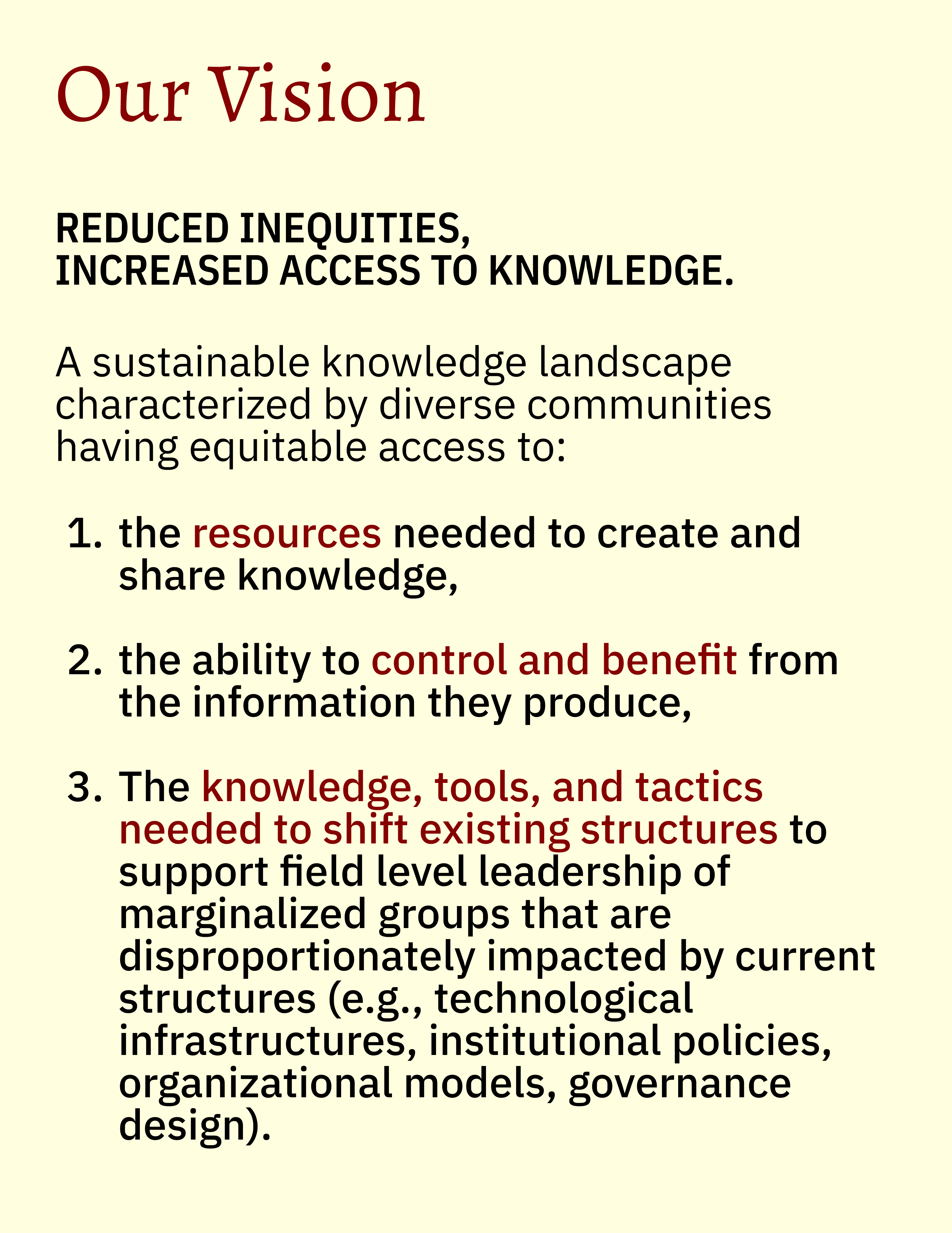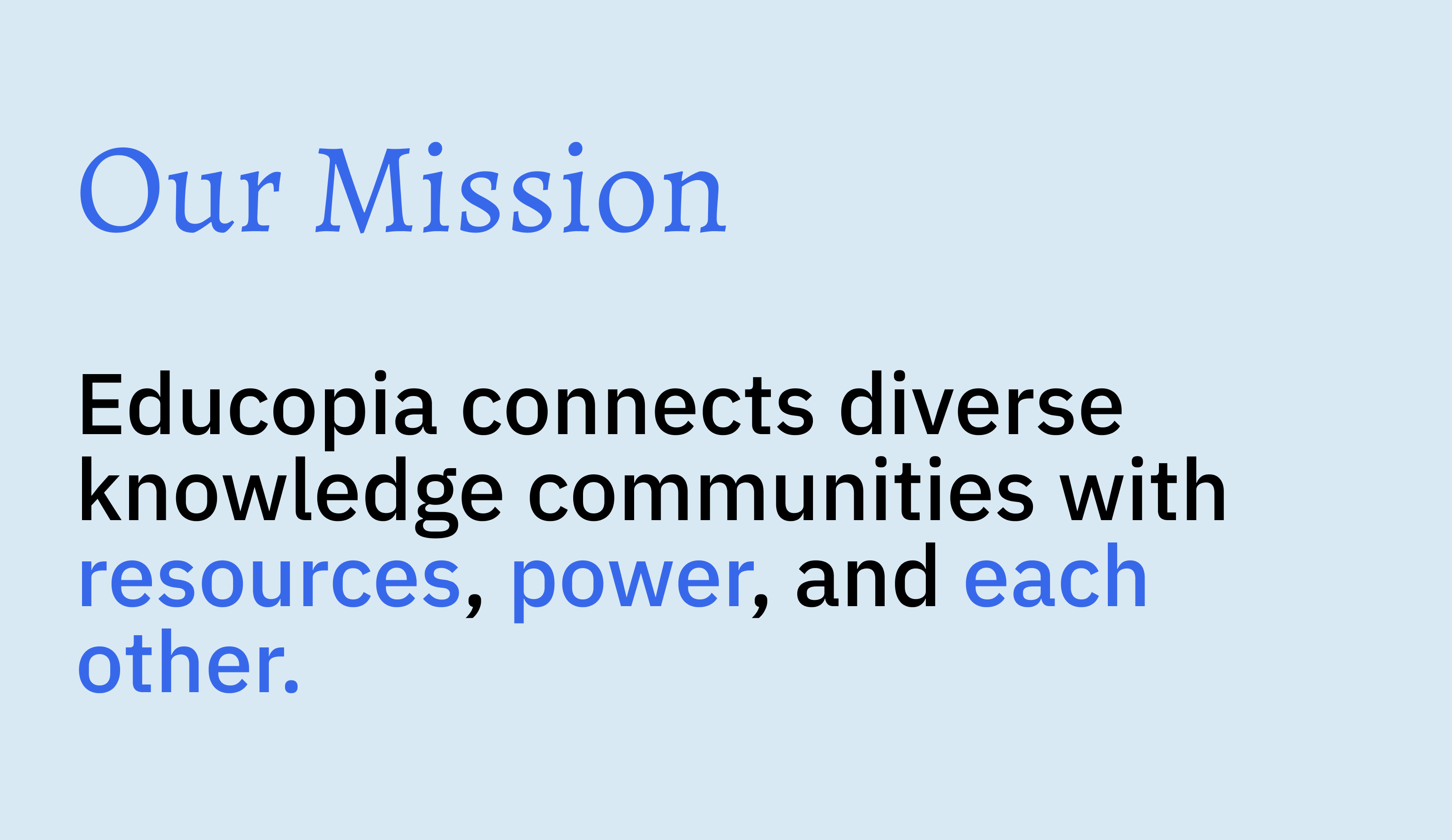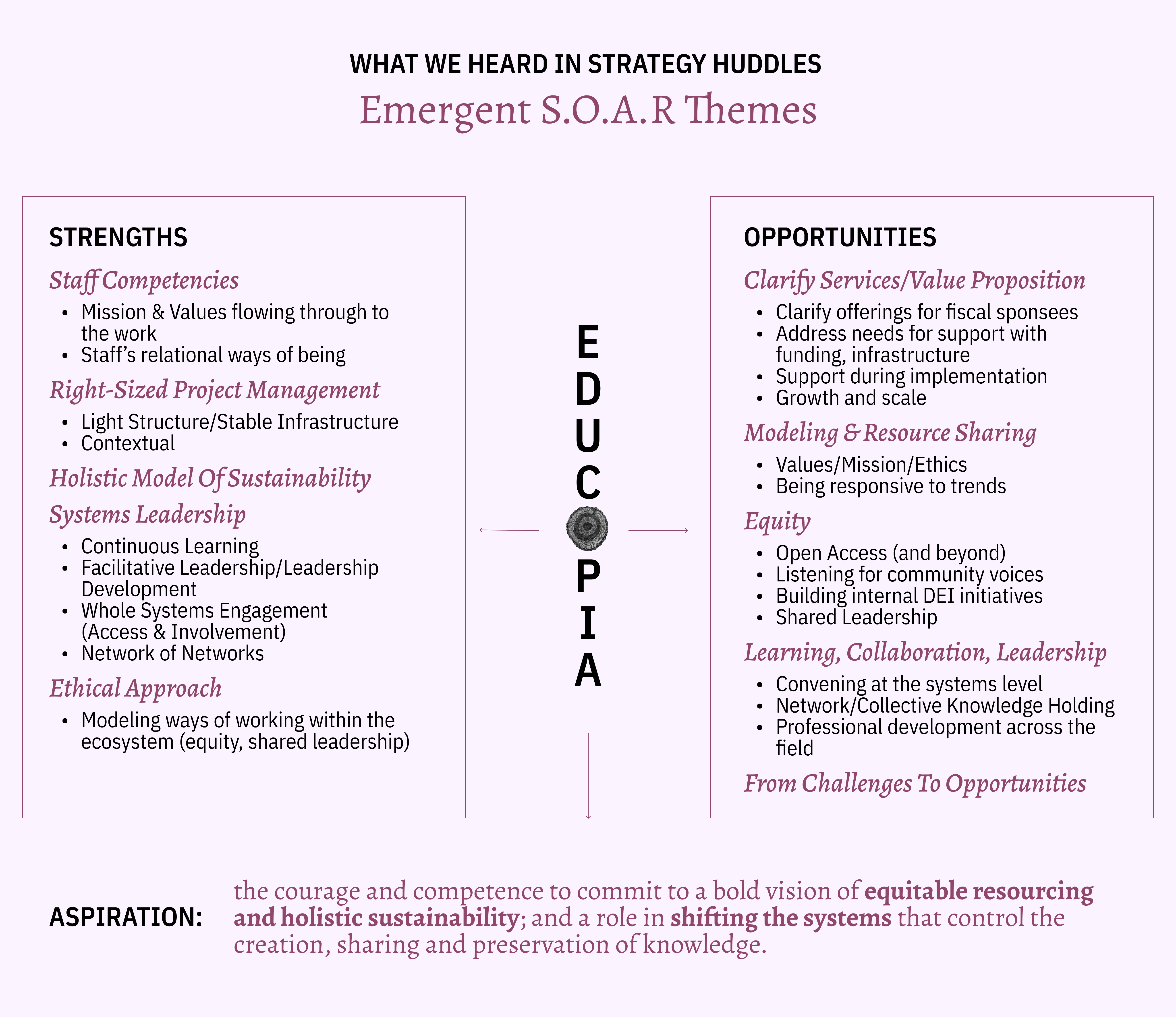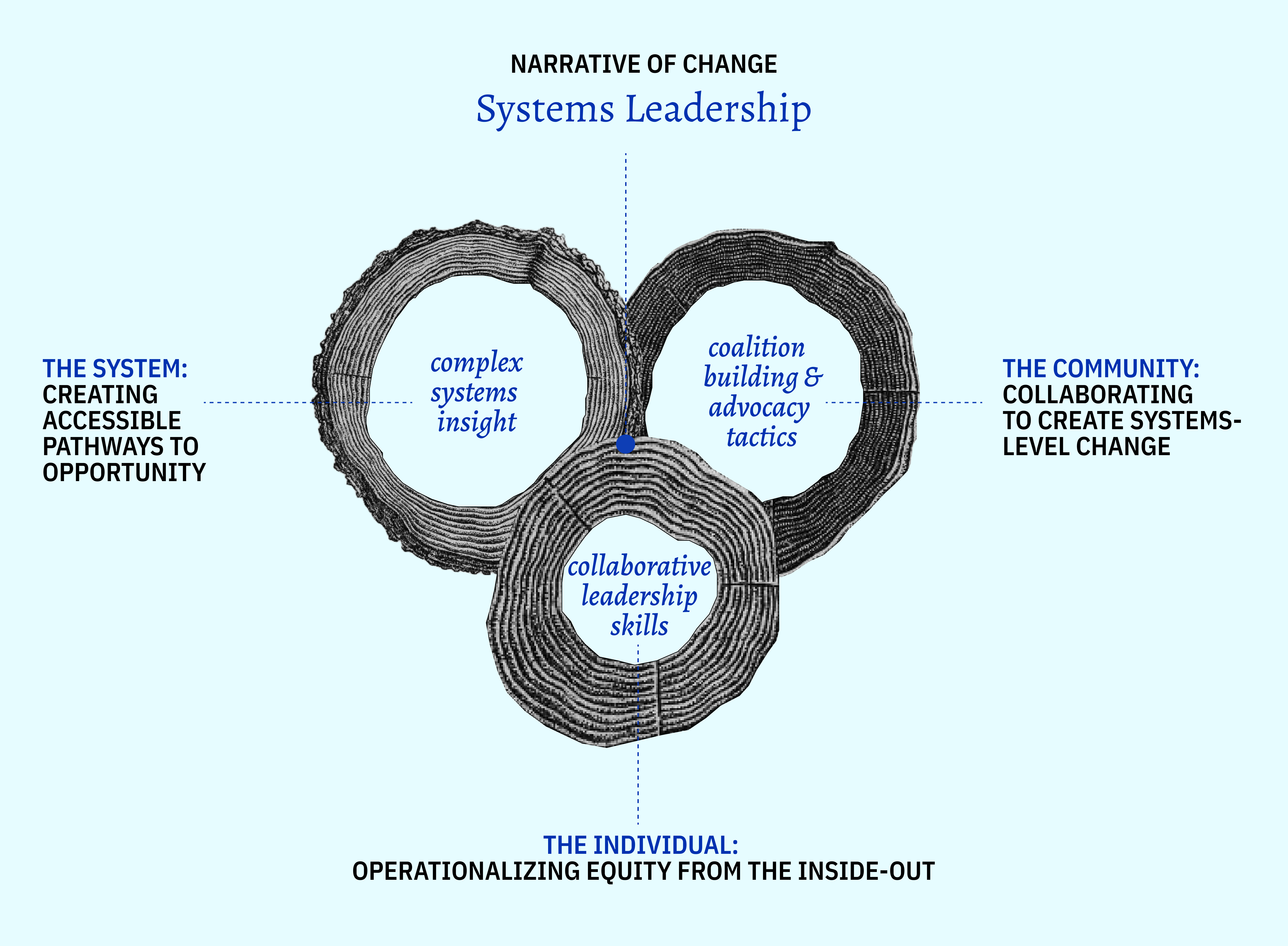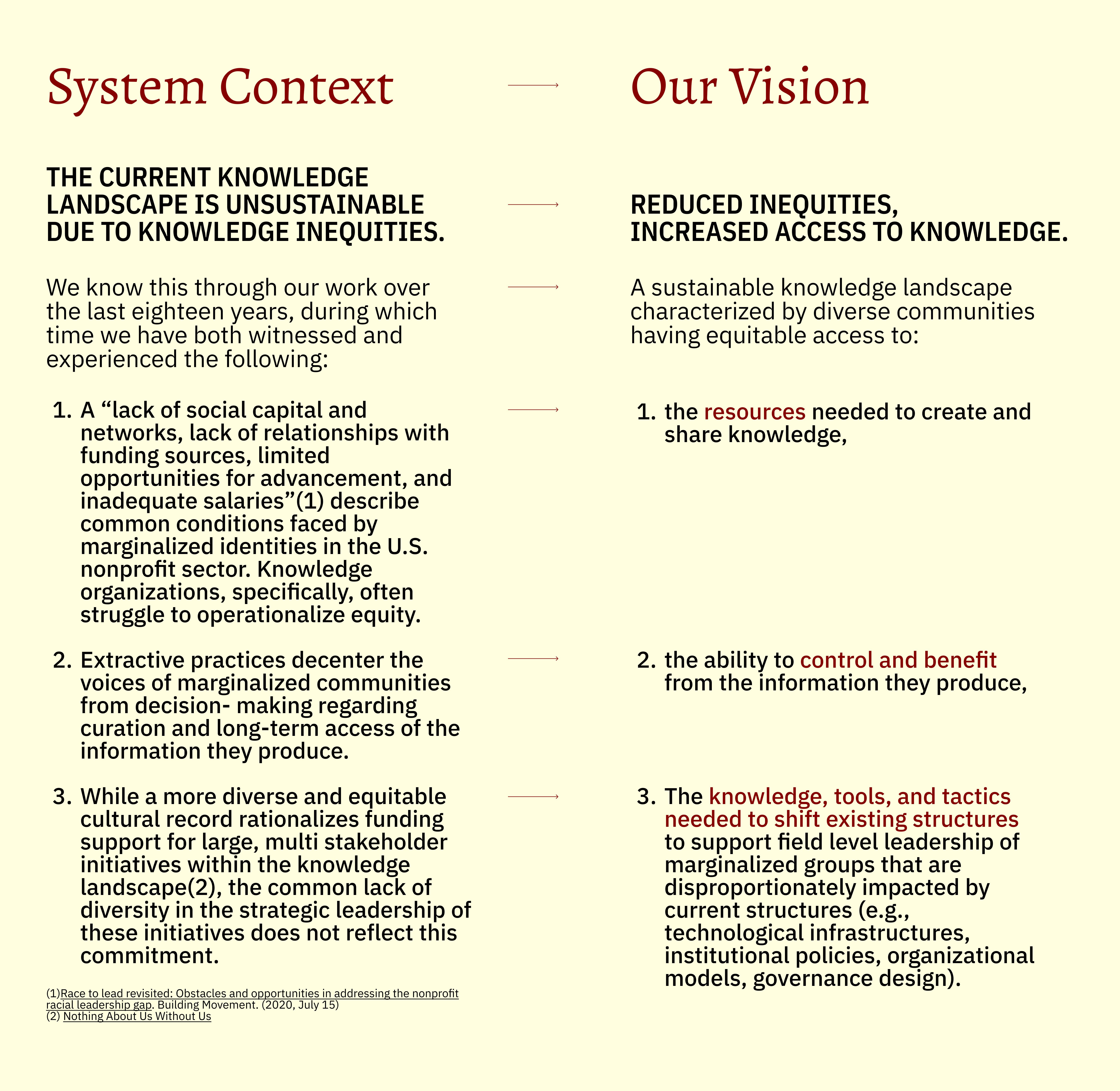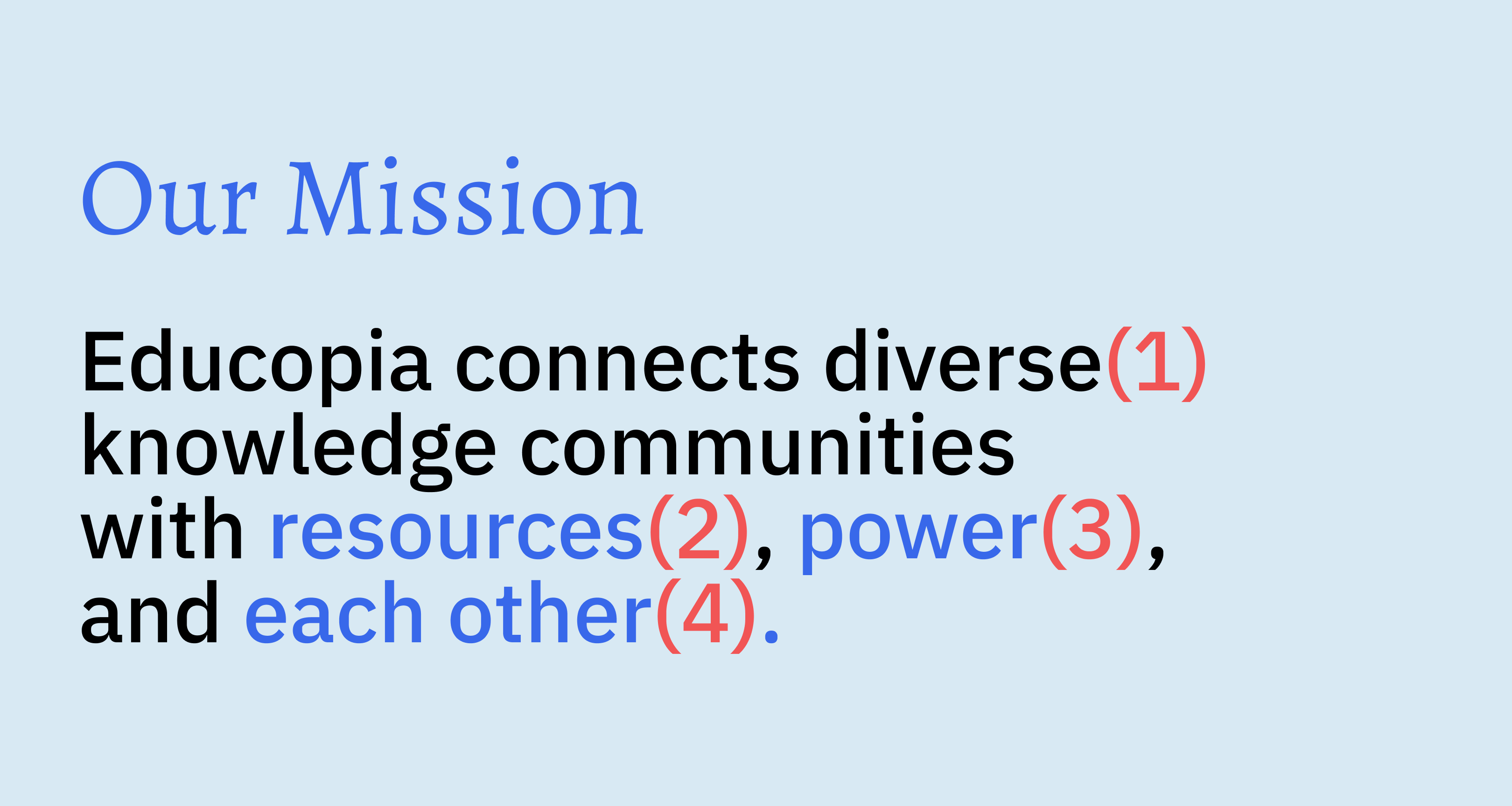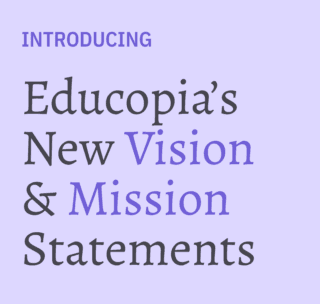
April 4, 2024
We have a Vision, and a Mission to lead us there
By Aloma AntaoSince October 2022, Educopia has realized a Shared Leadership Model, refined an iterative organizational development practice, and introduced tactics to continuously strengthen our relational framework, i.e., our ways of working in community. Today, we’re unveiling our new Vision and Mission statements.
Referring back to our own Community Cultivation Field Guide, as we continue to navigate through our period of Transition, we’re moving with the awareness that this work cannot, and should not, be done alone. Our strategic planning has been done in partnership with members of our communities, fiscal sponsees, consulting clients, Board members, and Staff. Throughout this process, we have received guidance from both educational resources as well as values-aligned, experienced practitioners in data strategy (DataForm Consulting LLC), networked governance (Circle Forward), distributed decision making (AORTA), and equity-centered financial planning (Nonprofit Finance Fund).
Staying true to our commitment to center relationships, share accountability, and build collaborative power, the beginning of our strategic planning process saw us hosting some of our most trusted stakeholders from across different dimensions of our work in a series of Strategic Huddles, to reflect on what strengthens and sustains Educopia—so that we can continue to help strengthen and grow the success of our partners, clients, and communities.
Many resources and learnings emerged from these collaborations and partnerships, the most significant being our Vision and Mission statements—co-created by Educopia’s Board and Staff, and corroborated by our communities:
Our Process:
Conducting Strategic Huddles with the ‘System In The Room’
From the end of August to mid-September 2023, Educopia and its stakeholders engaged in an Appreciative Inquiry strategic planning process utilizing the S.O.A.R. (Strengths, Opportunities, Aspirations, Results) framework—featuring rounds of storytelling and conversation about Educopia’s impact, ways of working, and programs. Planning consultants, Dee Washington and Tracy Kunkler from Circle Forward facilitated the sessions and translated conversations and notes into themes:
Synthesizing the themes that emerged from these Strengths and Opportunities explorations revealed a picture of Educopia’s core competencies and a clear role within the knowledge landscape. It also illustrated how our Fiscal Sponsorship, Research, and Consulting workstreams come together to weave a tale of Systems Leadership.
The data gathered and synthesized from the Strategic Huddles laid the foundation for our equity-centered, organizational Strategic Framework. This framework articulates a set of shared and explicit equity-centered organizational priorities and strategies, that we are now interpreting at programmatic and operational levels.
This Strategic Framework features our collectively articulated Vision and Mission, which will provide a clear direction for our organization by acting both as a North Star for major organizational shifts, and as guard rails for our day-to-day decision making.
Our Model:
Embodying Systems Leadership within the Knowledge Landscape
The constellation of qualities articulated in the Huddles, i.e., Educopia’s ability to “engage broad networks of diverse stakeholders to advance progress toward a shared vision for systemic change”, fulfill the conditions of Systems Leadership. Simply put, a Systems Leader fosters collective leadership across three levels:
- The Individual: The skills of facilitative leadership to enable learning, trust-building and empowered action among stakeholders who share a common goal.
- The Community: The tactics of coalition building and advocacy to develop alignment and mobilize action among stakeholders in the system, both within and between organizations.
- The System: includes the skills of facilitative leadership to enable learning, trust-building and empowered action among stakeholders who share a common goal.
These capabilities encompass both Educopia’s current strengths, as well as our aspirations for our future. Mapping the Strengths and Opportunities discovered during the Strategic Huddles to the Systems Leadership model got us to articulate a response to one of the questions that make up Ora Grodsky’s Guiding Ideas, i.e., what needs to happen to achieve impact.
Our Vision:
Mapping our Current Context to an Aspirational Vision
We often referred to our process of arriving at our new Vision as a form of time travel, immersing ourselves in the current system context (including our lived experiences and those of the people and places we collaborate with) in order to make an evolutionary leap to a desired future state—one that is grounded in Reduced Inequities, Increased Access to Knowledge.
Through our work with partners across the knowledge landscape over the last eighteen years, we know first-hand that cultural institutions, universities, collectives and other knowledge organizations need support in approaching collaborative work in ways that meaningfully center equity. We have also noted the persistent gap between publicly affirming equity commitments and meaningfully addressing the deep, structural barriers that are upheld by our institutions and fields, which manifest in:
- knowledge organizations struggling to operationalize equity,
- extractive practices that decenter the voice of marginalized communities,
- and a resultant lack of diversity in the strategic leadership of multi-stakeholder initiatives within the knowledge landscape.
In response to these prevalent conditions, our Vision addresses the need for equitable resourcing to alleviate conditions faced by marginalized identities in the knowledge sector; explicitly focuses on notions of agency and the need to address and shift existing power dynamics; and speaks to creating systemic change via field-level tactics:
The process of arriving at this Vision also resulted in significant shifts towards equitable decision making within Educopia. With Circle Forward’s able facilitation, we began (and continue) to experiment with a consent-based decision making process that allowed us to come to agreements after checking for risks and ranges of tolerance at different stages of co-designing our strategy. We also aligned our people and processes towards this common goal, instituting a Board/Staff Strategy Team (consisting of two Board Members, two Co-Directors, and two Staff Members) that stewarded the process and decided when the Strategic Framework was ‘complete’. This team was accountable to the larger Staff and the Board, who would respond to proposals by framing the picture, generating ideas, testing for consent, and providing generative feedback.
After serving its initial purpose, the Board/Staff Strategy Team transitioned into the Board/Staff Ideation Hub, and is focused on ideation, feedback, topically focused discussion, and thought partnership between members of the Board and the Staff. We also established a Staff Strategy Hub that features representation from all workstreams and a rolling membership model. This hub intends to ensure our alignment with our Strategic Framework all through the year, across all of Educopia’s activities and initiatives.
Our Mission:
Putting Our Ethos Into Action
The flip side of what one stakeholder called a “bold and audacious” Vision, is that it must be backed up by a clear, actionable Mission statement. Our Mission draws from our current context and future Vision to reinforce Educopia’s commitment to centering marginalized voices, using our power positionality to create equitable access to resources and power, and cultivating our relational ways of working in community.
The process of articulating a Mission anchored in authenticity and simplicity was challenging, as it forced us to move away from obfuscating language to get precise and truly say what we mean. It also allowed us to confront the harm of muddied understandings about what is considered core to Educopia’s work. In subsequent posts, we will explore each of these notions by teasing out various nuances and articulating shared definitions of specific terms held in our Vision and Mission (e.g., marginalized communities, diversity, knowledge justice, etc.). In collaborations with our peers and partners, we will examine how:
(1) Knowledges take many forms
(2) Knowledge travels through resources
(3) Knowledge is power
(4) Knowledge is nurtured in community
What Comes Next:
Operationalizing Our Strategic Framework
Looping back to the notion of Systems Leadership, a theory laid out in Stanford Social Innovation Review’s The Dawn of Systems Leadership states that true System Leaders pass through a number of “gateways” in their development, including:
- Re-directing attention: Seeing that problems “out there” are “in here” also – and the two are connected.
- Re-orienting strategy: Creating the space for change and letting collective intelligence and wisdom emerge.
- Practice, practice, practice: All learning is doing, but the doing needed is inherently developmental.
Stay tuned to see how Educopia is finalizing and implement an organizational development roadmap that includes these gateways, mapping them to our efforts to “shorten the distance between our values and actions(1)” by:
- Operationalizing equity from the inside-out: aligning our internal strategic, financial, and cultural development activities with the aim of addressing our priorities, commitments, and scenarios for change.
- Activating an equity-centered, organizational compass for planning: articulating specific Strategic Areas and associated internal and impact goals, with marginalized knowledge communities centered in the discussion.
- Evaluating our activities for alignment and impact: creating rubrics, guides, check- ins, and retrospectives to assess and meet our new Strategic Goals, both at the individual and organizational level.
(1) Mariame Kaba, interview with Prentis Hemphill, Finding Our Way, podcast audio, July 5, 2022, https://www.findingourwaypodcast.com/individual-episodes/s2e12.
